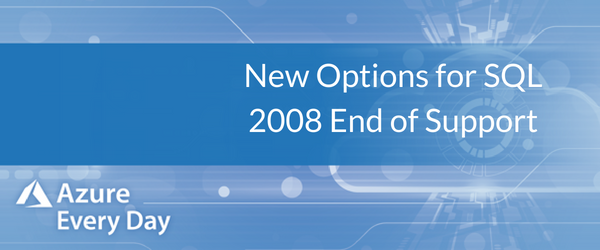Newsletter
Join our blog
Join other Azure, Power Platform and SQL Server pros by subscribing to our blog.


-1.png)
Start with the FREE community plan and get your lifetime access to 20+ courses. Get Instant Access Now!
Need help? Talk to an expert: (904) 638-5743

 If you’re using SQL 2008 or 2008R2, you need to be aware that the extended support for those ends on July 9, 2019. This means the end of regular security updates which leads to more vulnerabilities, and the software won’t be updated, and you’ll have out of compliance risks.
If you’re using SQL 2008 or 2008R2, you need to be aware that the extended support for those ends on July 9, 2019. This means the end of regular security updates which leads to more vulnerabilities, and the software won’t be updated, and you’ll have out of compliance risks.
The best option would be with either a migration or an upgrade, but Microsoft has some options in place to help people out as they understand this can be easier said than done when you have applications that need to be upgraded and you must figure out how best to handle that.
That being said, upgrading provides better performance, efficiency, security features and updates, as well as new technology features and capabilities within the whole stack of SQL products (SSIS, SSRS, SSAS).
Here are some options that Microsoft is offering to help with the end of support of 2008/2008R2:
Again, the first choice would be to upgrade or migrate those databases and move to Azure, but there are some challenges with doing so, and if none of those options work, there are some great options to extend your support.
If you have more questions about this or anything Azure related, we love this stuff and we love helping people move to Azure and to gain the knowledge to make the cloud work for your business. Click the link below or contact us—we are your best Azure resource.

ABOUT THE AUTHOR
Free Community Plan
private training
Newsletter
Join other Azure, Power Platform and SQL Server pros by subscribing to our blog.


-1.png)
Leave a comment